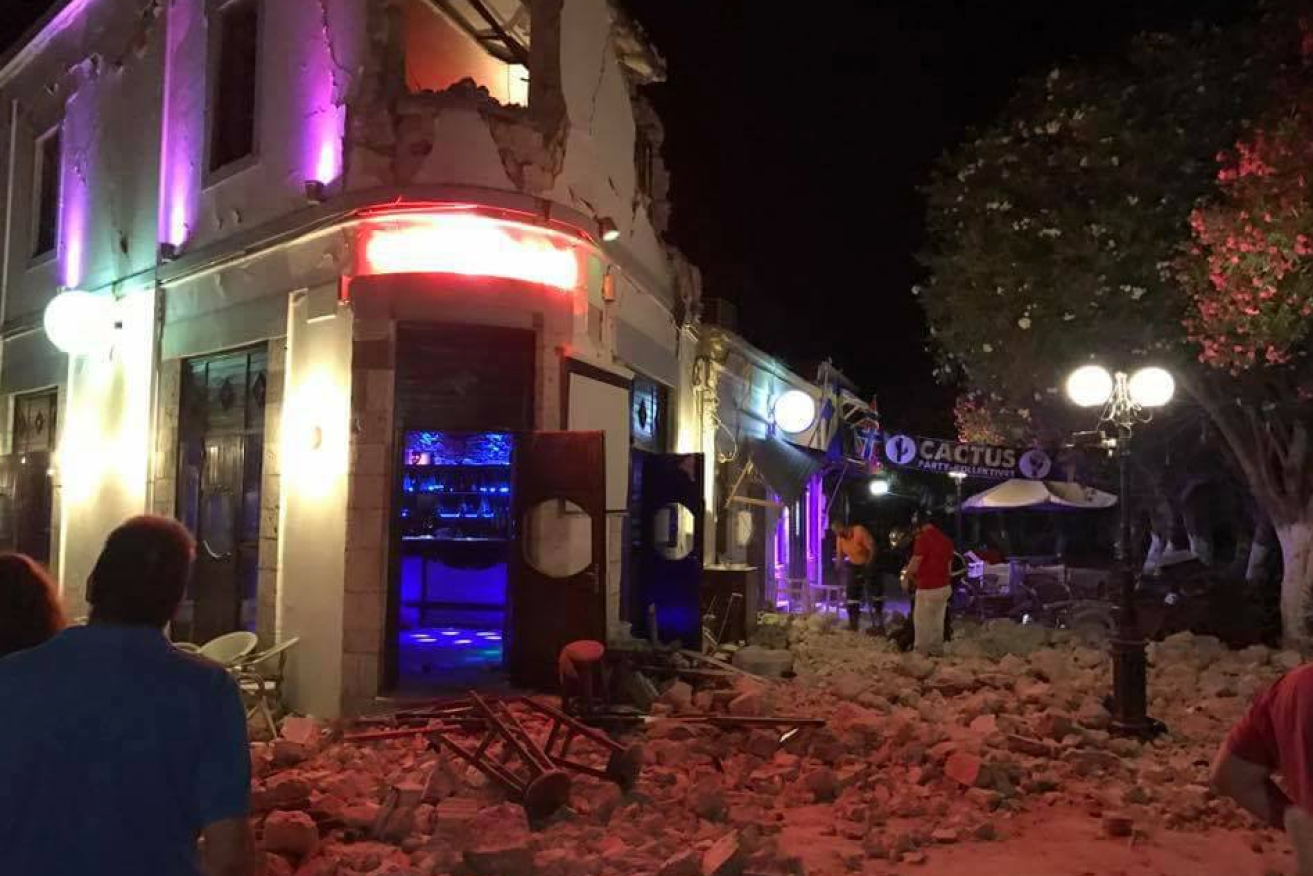Two people dead after powerful quake hits Greece and Turkey


The Greek island of Kos felt the brunt of the earthquake as one third of the island is without power amid damaged buildings and extensive flooding. Photo: Twitter
Two people are dead and several injured after a powerful 6.7 magnitude earthquake struck Greek and Turkish tourist resort areas on Friday, triggering a small tsunami.
The earthquake struck the cities of Marmaris, Bodrum and Datca on Turkey’s south western coast about 1.31am local time.
The worst-hit was the Greek island of Kos, where local mayor George Kyritsis told Reuters that at least two people were killed and hundreds were injured.
“We have two dead and some people injured so far,” Mr Kyritsis said.
He said rescuers on the popular tourist island were checking for trapped people inside extensively damaged buildings and confirmed that one building had collapsed.

Kos’s buildings and its historic port were damaged during the quake. Photo: AAP
Mr Kryitsis told Reuters the two people died when the roof of a bar collapsed. Dozens more buildings sustained damage including cracks in walls, smashed windows and shops destroyed.
The BBC reported that at least 100 others were injured, several in a serious condition, according to Kos regional government official Giorgos Halkidios.
Greece’s fire service said it had also rescued three injured persons from the rubble after earlier fears that people may have died in a collapsed building.
#kos island #Greece outside some bars after strong #Earthquake 6,7R in #Bodrum. 2 people are dead… pic.twitter.com/E31BtHUVwH
— Cloud_9 (@Mariellena) July 21, 2017
Holidaymakers and residents up and down the Turkish coast ran from their beds after the quake hit and have taken to Twitter to share their experiences.
Brit Kevin McNaughton staying near Dalaman, 190 kilometres from Bodrum tweeted: “Jesus just experienced earthquake in Turkey, literally crapped myself room shaking allover place, Just stood outside now no sure what to do.”
Many people ran out of their homes or holiday apartments with pillows and blankets, according to one Briton who is staying in Didim, around 100 kilometres from Bodrum.
Sophie Wild, a 21-year-old tourist from Kent, says she woke to a loud banging nose and just ran out of her third floor accommodation.
“We were asleep and were awoken by what sounded like banging on our door, it got louder and louder and the building started shaking. We jumped up ran to the balcony to see what it was (my first thought when we heard the banging was that we were being attacked).”

Many tourists took to sleeping outside after the quake hit. Photo: AAP
The port at Kos was among the structures to be damaged, and a ferry en route to the island has been unable to dock, the Coast Guard said.
The 6.7-magnitude quake was centred 10 kilometres south of Bodrum on the Turkish coast, and 16 kilometres east-northeast of Kos, according to the US Geological Survey.
Turkey’s Disaster and Emergency Management Presidency (AFAD) chairman Mehmet Halis Bilden warned residents and tourists to prepare for aftershocks.
“Our people should know that aftershocks are continuing, so they should refrain from entering damaged or vulnerable structures,” Mr Bilden told broadcaster CNN Turk.
https://twitter.com/OmerKrkcc/status/888184492980150272

A damaged vehicle in the Aegean coastal city of Mugla near Bodrum in Turkey. Photo: AAP

Damaged boats on a beach near Bodrum. Photo: AAP
Earlier, data on AFAD’s website showed at least 13 aftershocks (12 in Turkey and one in Greece) with five of them over 4.0 magnitude. One of the aftershocks was a magnitude 4.6 that struck at 1.52am.
A magnitude 6.7 quake is considered strong and is capable of causing considerable damage, but the effects of this one would have been dampened by striking in the sea.
Authorities warn people off beaches
In Bitez, a resort town about 6 kilometres west of Bodrum, the quake sent frightened residents running into the streets.
Hotel guests briefly returned to their rooms to pick up their belongings but chose to spend the rest of the night outside, with some using sheets and cushions borrowed from nearby lounge chairs to build makeshift beds, according to an AP reporter on the scene.
Authorities warned people to stay away from beaches, with the Paris-based European-Mediterranean Seismological Centre (EMSC) posting evidence of a small tsunami.
“Don’t go on beaches, don’t go in damaged buildings, follow instructions by national authorities,” the centre tweeted.
Aegean coast prone to earthquakes
Turkey is prone to earthquakes because it is located between the Arabian and Eurasian plates.
More than 600 people died in October 2011 in Turkey’s eastern province of Van after a quake of 7.2 magnitude.
In 1999, two massive earthquakes killed about 20,000 people in the densely populated northwest of the country. A 5.9 magnitude quake in 1999 killed 143 people in Greece.
— with agencies








